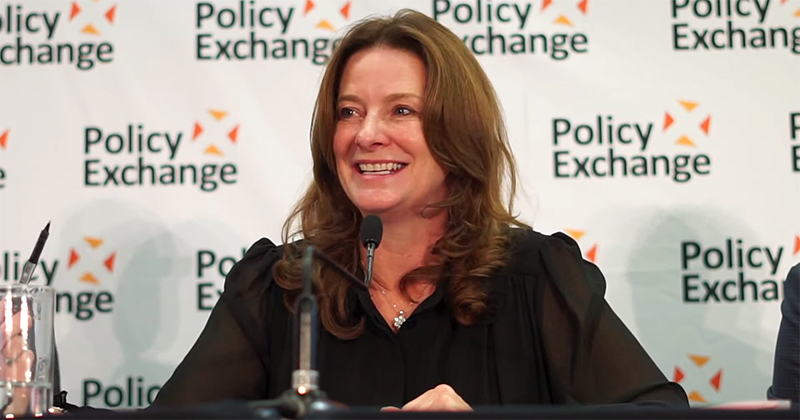Liverpool City Region metro mayor Steve Rotheram is donning a hi-vis vest, trowel in hand, and reminiscing to local college students about the hard graft of his first job as a bricklayer and how he’d be incapable of it today.
His attempts at bricklaying in front of young learners (and cameras) at the City of Liverpool College during Colleges Week are a PR stunt. But the image is an apt one because Rotheram is the only serving metro mayor to have had first-hand experience of life as an apprentice.
He is a champion of the apprenticeship system because it put him on the first rung of a very successful career ladder, including a spell at the Learning and Skills Council, after leaving school at 16 without English or maths GCSEs.
But he admits his construction attempts today “brought back memories that made me think I took the right decision not to be a bricklayer anymore. It’s a fantastic trade but…when you get to a ripe old age, you’re thankful you don’t have to do it every single day.”
This party conference season he has been bending the ears of Gillian Keegan and her Opposition counterpart, Bridget Phillipson, with his ideas on what’s needed to lift more young people out of poverty and into good quality jobs.
Keegan is from similar working-class roots in Huyton, a mile or two from Kirkby and Rotheram’s home turf. She was also once an apprentice. But that is where their similarities end. She has overseen a 3 per cent fall in apprenticeship starts in 2022-23 since becoming education secretary, whereas Rotheram has pushed his bold manifesto commitment of a “guarantee” of a job, training or apprenticeship to any young person out of work, education or training.
He claims to have done this through the 2019 launch of the UK’s first UCAS-style online apprenticeships portal which uses AI to help users write CVs and offer personalised recommendations. It was expanded last year into an all-in-one training and careers portal and there are early plans to build in progression pathways for users, for example by explaining the skills required for a career in offshore wind and where in the region you could get those skills.
The region also gives apprentices aged 19-24 access to half-price public transport, and Rotheram claims his recent plans to take the bus system under public control will also mean cheaper fares to “help people starting in the world of work”.

The Tory ‘wake’
Rotheram can’t resist the opportunity for a snipe at his Tory Scouse nemesis. “She ended up in the Tory party and obviously, I ended up in the proper party.
“She espouses things that are hard to disagree with, about working-class people getting chances and all that. But then as the secretary of state she hasn’t implemented some of the easy reforms and funding that are in her gift.”
But although he describes the atmosphere at the recent Conservative party conference as “a wake”, he was also spotted smiling with Keegan at a fringe event.
He explains that their conversation was around his claims that although higher apprenticeships at level 4 and above have grown (up 7 per cent from last year), most are in the City and in corporate courses that “the company would have paid for anyway”.
“It’s [courses] for multi trillion-pound companies…being paid for from the apprenticeship levy. That’s not what it was raised to do. More people with MBAs, that’s not going to tackle skills shortages.”
Keegan’s response to this was “very defensive” – but she did agree to “come up [to Liverpool] and have a chat about it”.
“Let’s see if she’s as good as her word.”
Keegan is not the first education secretary to say they’ll listen to Rotheram when it comes to his ideas for apprenticeships.
Eight education secretaries have been in post since he became mayor. Justine Greening was the first. On the eve that he became mayor in 2017, the Westminster Bridge terrorist attack locked down the Commons for several hours. Rotheram, then an MP, thought “sod this for a game of soldiers, I’m not just sitting here”, and used the opportunity to let Greening, about to introduce the apprenticeships levy, know his ideas around its implementation. She showed interest, but after being made mayor never responded to his letters on the issue.
He recently saw her in London and reminded her of their conversation.
He says she claimed that civil servants at the time had “sat on it”. “Apparently, she was up for doing some of the things that I proposed, and the machinery had got in the way.” Greening never responded to FE Week’s request for comment about this, but she was a signatory to a letter earlier this year urging the chancellor to review the apprenticeships levy due to the “billions” going “unspent by employers”.

Building up a career
Rotheram, who has seven siblings and whose father Harry was a forklift driver, says his upbringing “coloured” his approach to politics – his dad was a long-serving Labour councillor.
He came very close came to remaining a bricklayer, with his life path changing “literally by accident”. While taking down ceilings during a property conversion, Rotheram was “covered in black soot” when a man wearing a suit walked in.
When Rotheram asked him “how have you ended up with a suit on and I’m like this?” The man explained how he used to have a similar construction job, but returned to college to get qualifications.
“I just thought, yeah, OK. I’ll do that.”
After doing O Levels and an apprenticeship in bricklaying at Kirkby College, then an Ordinary National Certificate at a college in Bootle, he worked for a civil engineering firm in the Falkland Islands for eight months just after the war ended. It was “very desolate” – “no TV, one radio station…and you couldn’t even telephone home. You had to book a call”.
Upon returning home and a short stint as a house husband, he bagged a business manager position for the Learning and Skills Council (LSC), which gave him the opportunity to do a master’s in contemporary urban renaissance at Liverpool Hope University.
The LSC area director at the time was Elaine Bowker – now chief executive of the City of Liverpool College. “I still call her boss.”

Technical excellence colleges
It was during this time (2000) under the last Labour government that the LSC introduced the Centres of Vocational Excellence (CoVE) programme, pitched at the time as helping colleges specialise in the “skills needed to prosper in the new economy”.
Seven years later, the scheme was replaced by a new standard costing £8,000 to apply for.
But Labour leader Keir Starmer is now proposing a similar scheme to CoVE, this time branded “technical excellence colleges”.
Rotheram is backing the plans as “where we need to go”, and believes the new status could help create more “parity of esteem” between colleges and universities.
“The problem for us to tackle is that how [college courses] are perceived by some employers. A degree still seems to be of a higher status qualification than an NVQ level 5, 6 or even 7. I don’t get why there’s not yet that understanding.”
The biggest challenges facing his region’s colleges are in getting provision in place for courses around “emerging technologies” such as heat pumps, hydrogen boilers and electrical charging points, which they have been trying to solve by dividing up different types of provision between them.
Before devolution, Rotheram claims every college was “trying to do all of that individually and competing with each other when there wasn’t the scale. We can plan things much more strategically when we work together.”
He would like much more devolution of skills funding, but his own party as well as the current government have brushed aside his repeated calls for the apprenticeship levy to be devolved to local areas.
He is eyeing the trailblazer deals recently signed by the Greater Manchester and West Midland mayors Andy Burnham and Andy Street, hoping to be next in line for a similar settlement.
Those areas will get to spend up to half their free courses for jobs budget on any adult level 3 qualification to meet local skills needs, although the ring-fencing will be removed after the next election. They will also get more freedom over bootcamp spending.
More than anything, Rotheram wants an end to the “piecemeal approach” of local skills funding.
“Over three years, you can start to plan things….But all too often at the moment you’ll get little pots here and there, and you can’t really plan like that.”

Cradle to career
Rotheram used the opportunity of hosting the Labour party conference in his home city to pitch ideas to the shadow cabinet. At a meeting with Phillipson, he claims she was “really interested” in exploring an initiative his region is investing £5.25 million in, Cradle to Career.
It’s a place-based programme initiated and part-funded by a philanthropic foundation founded by the former chairman of housebuilding firm Redrow plc, Liverpudlian Steve Morgan.
The programme, which includes initiatives to support vulnerable learners, reduce the number of post-16 NEETs and create family hubs, was launched in 2021 in North Birkenhead in partnership with Wirral Council.
Since then, it claims to have boosted the reading age for more than 1,600 children, and significantly reduced the number at risk of being taken into care.
“We’re starting to see results filter through,” says Rotheram. He believes that giving children a “good start” in this way will save colleges money later down the line. At City of Liverpool College around 75 to 80 per cent of its 16 year old cohort leave school without the required GCSE maths and English, and Rotheram says the college is using “too much of their funding, as much as they can possibly pull in, to get kids to those standards”.
“That really should have been things that they gained in secondary school.”
The 61-year-old seems despondent about his ability to inspire the City College youngsters he spoke to today, however.
“It’s difficult to say ‘I was your age once’ because all they see is a grey-haired bloke,” he says.
“I still see myself as a 16-year-old standing, watching somebody telling us about how wonderful things are. But I want them to fully appreciate that [bricklaying] is not just a short-term qualification, it can lead them on to all sorts of weird and wonderful things – as it did for me.”







